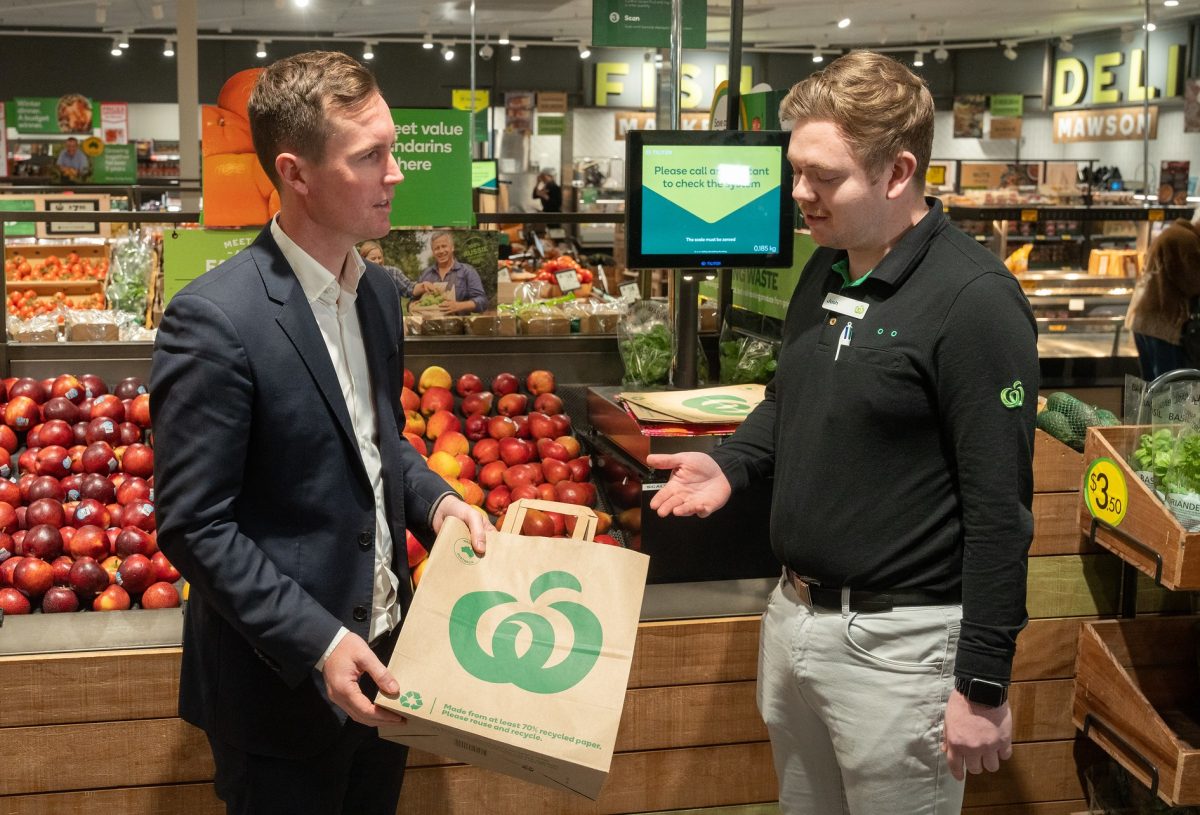
Canberrans will soon be putting their shopping into fabric or paper bags, with heavyweight plastic bags set to be banned in the ACT from 2024. Photo: Chris Steel MLA Facebook.
Several more single-use plastic items have disappeared from Canberra with the third phase of bans coming into effect.
The sale, supply and distribution of plastic plates and bowls, plastic microbeads in rinse-off personal care and cleaning products, expanded polystyrene loose fill packaging and expanded polystyrene trays became illegal in the Territory as of 1 July.
The ACT Government has also announced heavyweight plastic and boutique shopping bags (greater than 35 microns thick) will be banned from the start of 2024.
Heavyweight plastic bags became more popular when the thinner options were banned in Canberra in 2010, however they weren’t reused as much as had been hoped.
“We did see some members of the community use some of the heavyweight plastic bags that were meant to be reusable as single-use items,” City Services Minister Chris Steel said.
“So what this ban will mean is that we will have better alternatives that are more sustainable, that can still be reused but also recycled.”
Major retailers such as Woolworths and Coles have already started using cardboard paper bags instead of heavyweight plastic bags, and it’s hoped other Canberra businesses will follow suit.
“We know some of these single-use items often find their way into the environment or straight into landfill, where they persist for hundreds of years,” Mr Steel said. “So part of the reason we’re doing this phase-out is to make sure we’re moving to more sustainable alternatives that can break down or be recycled more easily.”
During a six-month lead-in to the change, representatives from the National Retail Association (NRA) are expected to visit up to 1600 Canberra businesses to educate them about the new ban.
NRA director of policy David Stout said representatives would be door knocking hundreds of Canberra businesses until the end of the year to make sure they understood the changes and alternatives available to them.
“We are visiting 1600 retailers across retail shopping centres, malls and strips across the ACT by 31 December,” he said.
“Ongoing education and support will continue to ensure businesses and consumers understand what’s banned and what’s not.”
While education is the first approach, hefty fines face people or businesses that continuously ignore the ban.
Single-use plastic takeaway containers and single-use barrier bags for fruit and vegetables in supermarkets will still be allowed at this stage, as suitable alternatives still haven’t been found.
Expanded polystyrene moulded packaging used for items such as electronics are also exempt from the ban.
“We’re working nationally with the new design framework to work with industry and the packaging industry to develop better sustainable alternatives that can be substituted in the future,” Mr Steel said.
It comes as major supermarkets have been granted conditional permission to resume in-store collections of soft plastics.
The Australian Competition and Consumer Commission (ACCC) authorised Woolworths, Coles and ALDI to continue their collaboration to manage the soft plastics stockpile after the industry-led program REDcycle suspended its recycling operations in November, 2022.
ACCC deputy chair Mick Keogh said this final authorisation was for 12 months, with the supermarkets required to apply for further permissions if any longer-term solutions to soft plastics recycling were found which needed their collaboration.
“We believe this conditional authorisation is in the public interest, reflecting public concern about the stockpiling of soft plastics and the need to divert soft plastics from landfill and inform consumers about the resumption of in-store collections,” Mr Keogh said.
“The authorisation has been granted with conditions that ensure there is continued transparency on the progress towards the [Roadmap to Restart] and that the public are kept up to date.”
REDcycle had been the only return-to-store soft plastics recovery program in Australia. It provided some initial processing before the soft plastics were delivered to partner recycling facilities to be turned into new recycled plastic products or be used in another way.
A liquidator was appointed when the program was declared insolvent in February.
A 12-month single-use plastic hotline (1800 844 946) is available from 9 am to 5 pm to provide telephone advice to support businesses and other organisations that comply with the legislative requirements. More information can also be found online.
Original Article published by Claire Fenwicke on Riotact.





